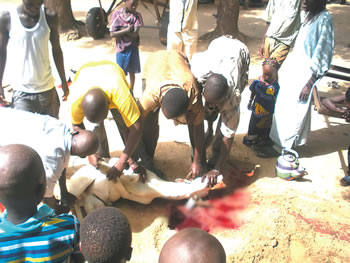Across the world where Muslim faithful are found, this year’s Eid-el-Kabir was celebrated yesterday. In Nigeria, however, the usual pomp was missing following a range of reasons from the nation’s economic downturn to unpaid salaries among others. SAM NWAOKO, PAUL OMOROGBE, ADEWALE OSHODI, BIOLA AZEEZ, YINKA OLADOYINBO, OLAYINKA OLUKOYA, CLEMENT IDOKO, JUDE OSSAI, CHIMA NWOKOJI, GBEMI SOLAJA, EBENEZER ADUROKIYA and ADETOLA ADENUBI report.
In Ogun, families, friends pool resources together
What should have been a full celebration became low key following very obvious realities. When Nigerian Tribune moved round to observe Muslims in celebration mood around Sango-Ota and its environs, it was observed that while many had a low key celebration, others combined with neighbours or family friends to ensure the traditional blood-spilling rite is maintained.
For these families, such cows were slaughtered at the point of purchase and shared amongst the contributing groups. This strategy afforded many families with enough meat for the Sallah celebration, while also reducing spending on meat due to the skyrocketing prices of rams.
According to a beneficiary of this arrangement who simply identified himself as Tajudeen Adisa, combining resources with family friends really helped. “The rams were very expensive and what the money I had on me could purchase would be very small. But when my friends came up with this idea, I really was relieved. We ended up buying a cow and sharing it at the slaughter slab. The portion given to me was surely bigger than what I would have got if I had used that same amount to buy a small ram,” he stated.
Another means through which Nigerians cut cost was seen in the low amount of parties that were thrown during the celebration. Many families celebrated behind closed doors with their immediate members.
Mostly hit by the economic recession were the beer parlours and hotels that hitherto used to be filled up to during festive seasons like this. When Nigerian Tribune visited the popular Leksokky Hotel as at the time of filing in this report, the poolside which used to be filled was scantily populated as many stayed indoors to observe the celebration.
For few that could not muster enough funds to participate in the cow sharing formula, it was common to see them celebrating without the traditional blood-spilling that accompany the celebration.
For Taofeek Lawal, a resident of Abeokuta, “I am celebrating this year’s sallah with the little amount of money I was able to save. I used to buy a ram for my mother to celebrate but I could not meet up this year’s because of the recession. I only bought three chickens to celebrate with my family, and I decided not to travel to Ibadan, my hometown for the celebration.”
In Ibadan, Alhaji Banji Akintayo, said he was able to afford a ram for this year’s celebration. He said the rams were easily available in the market, indicating the possibility of higher supply due to lesser demands. “We thank God for the celebrations this year, and fortunately I was able to purchase it conveniently not in terms of availability of cash, but getting it to buy in the market. If that happened, one can say that many people were not able to buy and that’s why I got it easily.” Commenting on the economic situation in the country, he said, “In everything put together there is hope for Nigeria. Let us believe that things will be okay, and that next year things will be better for all of us.”
Giving a similar view, Alhaji Mustapha Bamgbade, President of Owode Housing Estate, Ibadan, said “This year things are not as rosy as last year. But I urge our Muslim faithful to be patient. Things have been bad before. Let us be hopeful; better days are ahead.”
For Ekiti residents, it was a quiet celebration
Musa Quadri Femi, a resident of Ekiti State, would rather thank God than mourn his lot, though he added that the reality of taking care of his children’s school fees was more important than slaughtering an animal.
“I couldn’t slaughter a ram this year due to the economic hardship. As a matter of fact, if it was possible to postpone the celebration, we would have loved it to be postponed. I say this because after the celebration, the children are going back to school and there are so many other needs that surround that.
“Interestingly, as a political leader in my local government, I was unable to give anything to my party members and supporters because of the extant economic hardship. We have even been unable to hold our usual meetings with them or to interact as much as we used to because there’s nothing to give to them at this period.
For Mr. Tajudeen Ahmed, a barrister, “We just have to thank the Almighty Allah for everything, especially for life. But it must also be stated that this year’s Sallah is quite on a low key because of the economic recession. Things are so hard and a lot of people just couldn’t meet up with their various needs.
“Even the government that usually presented gifts to people has not been able to do so this year because of the recession. The hardship is everywhere. I’m even aware that this year, the government that could give rice and other food items, did not do so this year. However, we thank God for life and even if it is for that very precious gift alone, we must thank God.”
How we prioritised our needs—Abuja residents
In Abuja, the Federal Capital Territory, residents stated that they had to prioritise in order not to increase their financial handicap in the face of the recession.
For Mr Sani Abdullahi, a civil servant, “I used to kill two rams, one for the family and the other would be shared to my neighbours and other relatives. But this year, I could buy just one ram. By next week, schools will resume. I’m not staying in a rented apartment but many others would have to contend with rent in addition to ensuring the provision of other basic needs of the family. So, the best is celebrating within the limit of your resources.”
Also speaking, a house wife, Mrs Zainab Bello, said her family could not travel this year for the celebration. “Definitely, the celebration this year for my family is symbolic. We decided to spend the holiday here in Abuja in order to cut cost.”
Transporters at various motor parks also confirmed to Nigerian Tribune what they described as the lowest turn-out of travelers compared to other festive periods.
However, Mr Saidu Abubakar, who was interviewed at Mararaba Motor Park on his way to Kano, said ram or no ram, his family is used to celebrating Sallah at home. He added that the joy of Sallah celebration is in uniting with one’s family members and loved ones.
“I do not doubt that people are complaining about hardship but it depends on your priority.”
Mrs Suara, a house wife, who was not left out in the harsh economic realities in the country, said “The most important thing during this Eid celebration is the ram slaughtering. We all have priorities that are equally important. Our children are all going to school. We have school fees and prices of other things have also gone up. So, to us the celebration is marked with low-key. We won’t be going to Gardens with the kids. Everybody knows what is happening in the country”.
‘We couldn’t ignore our children’s school fees just to celebrate’
Alhaji Abdulganiyu Okunola, a resident of Ilorin metropolis, his children’s school fees would naturally take preeminence over the celebration. According to him, “I only take care of those things that are necessary. School fees are still there to be paid, so no ram this year. What I told my children is that I will take them to Shoprite for sightseeing. We will also do with food or meat given by neighbours.”
For Alao Sefiu, a trader, “What we have at home is what we washed and ironed. There are school fees waiting to be paid. No ram.”
Mr Daud Salawu, a civil servant in Ilorin also shared a similar opinion. “No salary in the last five months. What do I do? I can’t kill myself. I gave my kids what I could afford.”
In Lokoja, Muslim faithful bemoan the economic hardship
According to Adoza Ibrahim, a building contractor, he was unable to celebrate as usual. He said prior to the present situation, he had always celebrated with at least three rams but the economic downturn made him to buy only one this year.
He said since the beginning of the year, he was unable to execute any contract, adding that those already executed were not paid for.
A shop owner along Ganaja road in Lokoja, Abdulahi Shuaibu, said there was no difference between the ordinary period and the festive period in terms of sales.
According to him, “Since it is was difficult to make meaningful sales before and during the festivity, my celebration has been hampered and I have to plead with my family to reason with me. The situation was further worsened by the fact that schools will resume next week”.
Also speaking, a primary school teacher, Hassan Itodo, said this year’s festival was the most difficult he had witnessed in recent times.
According to him, non-payment of salary coupled with high cost of basic materials in the market made it difficult for him and his people to have a fulfilling celebration.
In Lagos, celebration was low-keyed
In Lagos, Nigeria’s commercial centre, the celebration was low-keyed. A corporate printer at Surulere Lagos, Mr. Kayode Yusuf, told Nigerian Tribune that the challenge he had celebrating Sallah was the delay by his customers in paying for their jobs. The second was high cost of not only printing materials but also food items including rams.
According to him, many of his customers complained that they were being owed salaries and the little money they had could not buy them enough food items due to the high cost of food things.
Also, Alhaji Abolore Kaseem said he could not prepare for the Sallah celebration due to cash crunch. He explained that on Monday morning the banks did not help matters.
“I have been going from one automated teller machine to another just to make withdraws. The ATMs are not dispensing cash. Can you imagine that I have been jumping from one public bus to another to get any amount of money for my wife to cook what we would eat?” Abolore lamented.
Speaking Mr. Anwoju, a Shomolu resident, said he was able to maintain his luxury despite the economic challenges. “The recession has definitely affected everybody. But in my case I was able to buy what I used to buy in the preceding years,” he said.
For Mr Oladotun Hassan, “I could only afford a ram for my parents as a mark of honour. The realities are painful.”
Alhaji adedeji, a resident of Bariga, stated that “I have been seriously affected by the economic woes bedevilling the country currently. Before, I used to buy two rams and two cows. But now, I have been forced to cut down on my expenditure because of my children’s school fees and other needs.”
Few celebrate in Enugu
IN Enugu State, there were a few people who celebrated the festival due to the nation’s economic challenges.
For Hassan Abdusalam, a cattle seller, the Eld Kabir festival this year is worth celebrating despite the economic downturn. “ I advise my other Muslim brothers to live according to their means. If you cannot buya ram, do not worry,” he said.
Mallam Ahmed Ibrahim, a cobbler, said he had no money to buy a ram. “I have no money. I could not even travel to join my family for the celebration,” he said.
For Muslim faithful in Warri, Delta State, celebrating within their means was reiterated. According to the Secretary-General, Warri Central Mosque, Suleiman Odejide, “for the fact that Allah spared our lives, we need to thank him for that. My advice to all Muslims is that whatever situation we find ourselves we should be grateful to Allah.”
Also, the Imam of Igbi Mosque, Azeez Alfarufa, said “we give thanks to Allah for everything, no matter how hard the situation is, we must celebrate it. Slaughtering rams is not compulsory, but it is the happiness associated with the day that matters, if you don’t have money, no problem.”







